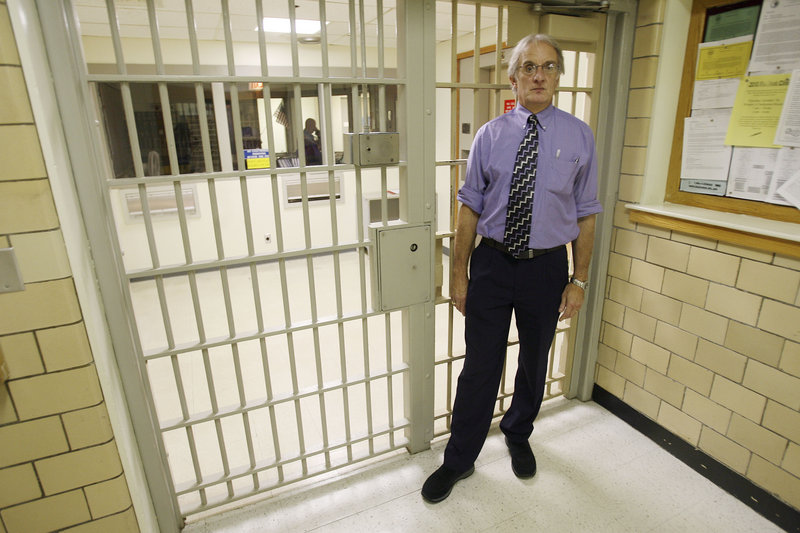CONCORD, N.H. – This month, New Hampshire will seek bids from private businesses to build and possibly operate a 3,000-bed men’s prison and a 300-bed women’s prison.
The bids will explore having private companies build and operate the prisons as well as the possibility of such companies building them and leasing them back to the state to operate, Corrections Commissioner William Wrenn said. The state also will ask the companies for other ways that privately building the prisons would save money.
The state issued bid requests this month for privately operating nursing, pharmacy and sex offender treatment operations. Wrenn said the hope is that a private contractor would hire the state workers performing those functions now.
Gov. John Lynch wants to know whether New Hampshire can save money by letting business do what the state has traditionally done. Lynch has long supported building a regional prison that takes in inmates from Maine and Vermont. His initial idea was to build the facility in northern New Hampshire, but Wrenn said the bid requests call for building the prisons anywhere in the state.
Wrenn said the bid requests to build the prisons are being finalized and will be released soon. The state hopes the bids will show how much the state could save.
A legislative study committee has started exploring ways to privatize prison functions. Senate Finance Chairman Chuck Morse believes the responses to the bids and the committee’s report due Dec. 1 should give lawmakers better information to decide what is possible and if legislation can be acted on next year.
“I would hope we would have something in the spring. We’ve got to fix the Concord prison or move,” he said.
At the least, Morse believes a new facility will have to be built with private funding.
Wrenn said he does not know what it would cost to build a 3,000-bed men’s prison, but it easily could be $150 million to $200 million.
The size of the new facility would be large enough to hold all of New Hampshire’s inmates plus prisoners from other states. New Hampshire has about 1,349 men in the Concord prison, 61 people in the secure psychiatric unit there and 600 men in its Berlin prison. About 100 inmates are at the women’s prison in Goffstown and eight are in the Strafford County jail.
The proposals will call for the companies to build on private land, though the state has not ruled out the possibility of using state land, Wrenn said.
“We might be interested in looking at an agreement with the state of Maine or any other state,” Wrenn said.
The proposal does not call for New Hampshire sending 600 of the inmates in its Concord prison to other states, an idea raised by Morse during budget talks last spring. Wrenn said that would not save the state money because it would have to continue to operate the Concord prison and take on the additional cost of paying someone else to incarcerate the 600 inmates. He estimates it would cost $5 million to send the inmates elsewhere.
The Senate wants information that he hopes the bids will provide on the best way to save operating costs and keep the state from assuming the cost of replacing the aging Concord facility, Morse said.
The state has recently focused on releasing some inmates into a community corrections program where they can get counseling and treatment to help keep them from returning to prison. Wrenn said one question the state needs to answer is whether a private company running the state’s prisons would maintain that priority rather than keeping inmates locked up to fill beds.
“They’re in the business to make money,” he said. “They’re going to be looking to be sure all the beds are filled to make a profit.”
That also concerns the State Employees’ Association, the union that represents most of New Hampshire’s workers.
The union wants to be sure the corrections system is high-quality, promotes rehabilitation and protects inmates’ rights as well as makes victims and the public feel secure, said SEA President Diana Lacey.
Lawmakers need to decide what kind of prison system they want and if the community corrections model is the best way to rehabilitate inmates, said Lt. Paul Cascio, chief of security of the psychiatric unit and a member of the union corrections committee opposing privatization. If so, they need to revisit tough mandatory sentencing laws that hinder the model’s goals by keeping people in prison who might do well with counseling and supervision, he said.
Lynch press secretary Colin Manning said the request for bids is an early step in the information-gathering process.
“We’ll see if we receive any proposals that achieve cost savings,” he said.
Copy the Story Link
Send questions/comments to the editors.



Success. Please wait for the page to reload. If the page does not reload within 5 seconds, please refresh the page.
Enter your email and password to access comments.
Hi, to comment on stories you must . This profile is in addition to your subscription and website login.
Already have a commenting profile? .
Invalid username/password.
Please check your email to confirm and complete your registration.
Only subscribers are eligible to post comments. Please subscribe or login first for digital access. Here’s why.
Use the form below to reset your password. When you've submitted your account email, we will send an email with a reset code.